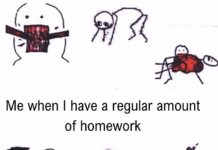I attended the Monday night assembly at the Smith Center and listened to the students and President Behre discuss the campus’ situation regarding racial issues. Some may say there was nothing sequential about the evening’s proceedings, but there really did not need to be. I was impressed with the clearly heart-felt expressions that came from many good people. I offer here nothing that disputes any major points that people raised. I merely wish to raise a few matters that could have come forth, and which may be of use to some as they further contemplate and discuss matters among themselves as our community evolves.
In regard to the actual notes scribbled on the poster in Rhoads Hall, the scribblings that prompted the press coverage and the campus meeting in the first place, I may have actually relayed a “thank you” back to the person(s) who wrote on the poster. After all, they cited the fact that African-American men comprise but 6.5 percent of the US population while they constitute 52 percent of those convicted of murder; this leads me to respond: Thank you; your statistics may indeed underscore how the criminal justice system appears to be strongly weighted against African-American men. (Asian and White men and women accused of murder are certainly convicted at far lower rates.)
Similarly, when you point out that 35 percent of abortions are performed on African-American women, you do indeed underscore the sad fact that many poor women, especially in the inner cities, have little financial or logistical means of access to other forms of birth control and, amidst their poverty, have then to resort to means which can be both medically dangerous and, for some, ethically agonizing. So thank you for pointing this out.
Dishonor hostility
With mental agility
(And a mere mask of civility);
‘Specially when the hostility,
By its clear anonymity,
Shows itself to be cowardly
And devoid of civility.
This puckish cast in such a comment links me to a point I would ask President Behre and others to consider as an augmentation to what they have already expressed on Monday evening.
In the context of seeking to nudge people toward open discussions of such important topics as race on campus, President Behre level-headedly urged that name-calling be kept to a minimum. In one sense, he is correct: discussions about such sensitive matters as race should not be regarded any some sort of debate or contest. But in another sense there is a matter with which many minorities have to contend and which cannot always be ignored. I’ve seen it here and I saw it quite starkly at a school where previously taught—a highly competitive New England prep school called Exeter, where the students felt themselves to be in keen rivalry with one another, as so many were intent on getting into places such as Yale and Harvard. At the lunch tables, in the five minutes before class, and in so many other places, African-American students found themselves repeatedly hit with such little barbs as: “you’re just here because of Affirmative Action” or “I’ll have a tougher time getting into Harvard, as your race gives you a leg up on me.” This happened, and happens, all the time. I have experienced some of the same little shots in my years here at SRU: Several times, when I’ve published books, I’ve encountered such smiling snips as: “You Jews certainly do overachieve don’t you?” (And these came from faculty and administrators.) For me, because of age (and tenure), this has not prompted much of the emotional churning that I believe many young African Americans go through with any such daily naggings. The point here is, as no less than such a genius as the writer James Baldwin once commented: all such barbs seek to diminish the humanity of the targeted person. To Baldwin they were but milder versions of “N___!” The racial “snipers” shoot the little darts because they feel threatened, and they want to reduce the ferocity of what threatens them.
Students hit by such darts can feel their humanity diminished, and they want to get it back. It’s only natural. It does not pay to fake it and say: “it doesn’t bother me.” For if it really does hurt, the false denial only makes it worse. At the same time, any verbal responses can too easily waste valuable time. The dart throwers are obviously not in a mood for honest discussion anyway. The person(s) who “graffiti’ed” the poster in Rhoads is such a sniper. The solution is to figure a way to reclaim that snippet of humanity people like the Rhoads’ dart thrower took away, and to do so as deftly and quickly as possible. We can’t pretend it did not happen; the question is what is the best recourse.
I propose a solution here, which I call a “tactful tactic,” is one that involves but a little more assertiveness than Pres. Behre’s ideas suggest, but one that reclaims one’s humanity. It takes virtually no energy or time to carry out, but it does take a lot of work in careful preparation. It is a solution that a student friend of mine at Exeter used to great effect every time she was hit by a darting reference to her allegedly privileged Aff. Act. status in getting into a place like Yale (which she did). Every time she felt such a verbal arrow shot at her, she smiled and took out a recently returned test or quiz in Math or Chemistry or English. She’d casually look at the dart thrower and say: “Look; I just got a 92 on this Math test; what did you get?” This usually chilled their s___ right out.
Hey sucka’,
You want to get in my face & put me “in my place?”
Well, I’m kickin’ it in Math;
How you doin’, Ace?
The outer point here, of course, is not only that this student would never feel in any way degraded, or derailed from her work, when she has a recently aced Organic Chemistry test proudly at the ready. Any “dart” thus misses its target. The humanity of the “target” remains totally intact (and smiling broadly), while the “shooter” usually slinks away. President Behre is right when he says it’s not about winning, but retrieving and holding onto a diminished sense of one’s humanity is a matter that cannot be ignored either.
A second point here is more important. That student at Exeter had to involve herself in that totally liberating thing called hard work. This is the element I offer as an addition to the otherwise useful discussions of Monday night. As a veteran of 35+ years of teaching, I can assert that if you are really focused on your work, any petty efforts to derail you will seldom have their desired de-humanizing effects. It may seem simple, but quality performances via hard work usually settle any discussions about who deserves an admission or a job or a promotion.
Students, you are here, fundamentally, not to form a community but to use an existing, evolving community (to which you certainly contribute) to propel yourselves towards satisfying and fulfilling careers and lives. President Behre and the rest of us— administration, faculty, and staff—are here to help you. That is our job, and we do it gladly. Your job is to use us to further yourselves. We’re here to assist, and our hope is that with our assistance you’ll nail those top marks in Chem., Accounting, Calculus, English,…and become that PT, PA, MD, CPA, … From there many of you will then pursue careers, start families, and establish yourselves in communities of your own making and continue the processes of lending others your support.
From Monday night, I affirm that we are sincerely grateful to you students for helping SRU continue to hone and improve the quality of the community that we build in our efforts to help you rise in your various career and life goals. Let the overwhelming majority of your time here then be spent on the body of work you need to master SO YOU CAN go forth from SRU and make your lives better and make the world a better place. Dwell on your work and, from time to time, let us know how we can make your environment better. Let us do our job SO YOU CAN best do yours. In such an environment of support and well-focused studying, nagging things like graffiti scrawled on a poster in a dorm will matter little (and can even be deftly turned into points of entertainment for the rest of us.)
Their lies the bargain:
We’ll help furnish the tools
While you attend to your garden.
–Alan Levy, History Dept.





